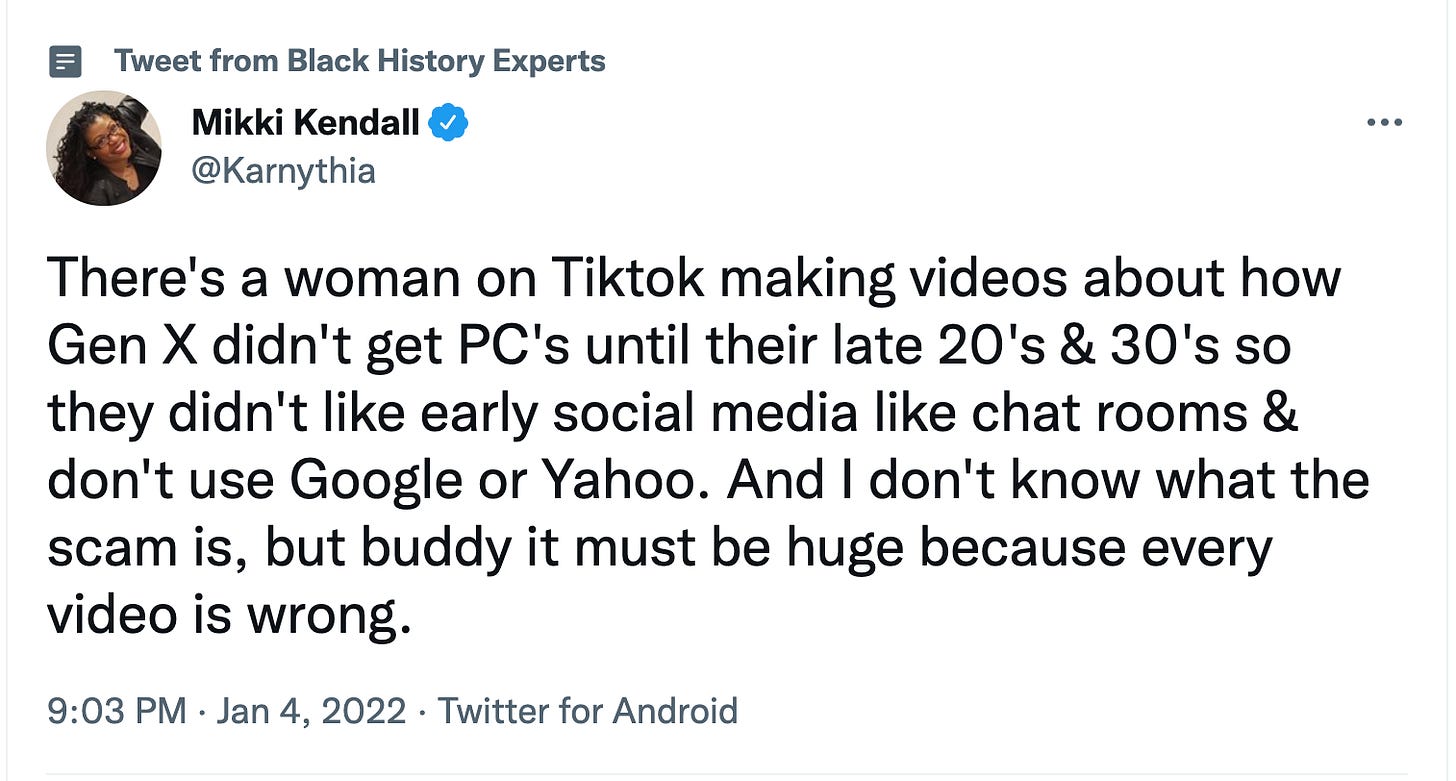We are (always) in the machine
Narratives of Black absence in technology pervade, despite the real history and our lived experiences to the contrary
On Twitter last week, a thread by @Karnythia triggered a memory of a conversation I had with @proftyler about another memory, that of my first tech job in New York City. And while the tweet was about GenX, Black Twitter’s powerful response has led me to consider some of the ways in which we narrativize Black people’s relationship with technology.
In 1996, I arrived in New York City to work for an Internet company (we called them dotcoms way back when) that promised to serve as a guide to the Web. Back then, you could literally clock sites as they came into being. It was like witnessing the birth of a new star—or a galaxy (on a good day). For me, each day held a promise. It was thrilling. This was my job.
In addition to being the copy editor, I logged all the new sites, wrote reviews, contributed to a database of new web presences, and created indexes for the books we produced—which promptly became outdated upon publication, as sites shuttered or shifted. We were still trying to figure things out. Back then, it was the boom. We were young, excited, earnest, mainlining coffee from the overpriced machine bought with investor funding. I survived on a daily ration of California roll and miso soup. I clocked in at 98 lbs., on a humid NYC day. I was the only Black person working there.
At any rate, this thread reminded me of all the Black folk working in tech at the time. Although the tweet was about the broader community of GenX, we often have conversations about Black absence quite a bit. And it’s always jarring to see in the contemporary moment, what is understood as our digital past. It is a past that gets narrativized around Black “lack” and “absence.” I am glad to see the abundant pushback from Black Twitter. I encountered my first Mac in the 10th grade, but my friends had PCs well before that. I still have my Smith Corona word processor (in its original case). Yep.
But for me, working in tech journalism back then, I also saw, knew, and was mentored by Black folk. One of those is Stephen C. Miller, who pulled me aside at a conference one day in the early 2000s to talk tech. He’s been my mentor and friend since then. What I learned from Stephen is that the road I had taken in tech, was the same road that he and others (such as Joel Dreyfuss) had also navigated—Home Office Computing, Ziff Davis, Black Enterprise, and so on. My friend, Paula, worked at IBM before we met at Black Enterprise. And I bugged her into a friendship so she could tell me about that history. What was it like for Black folks in tech during the Reagan Era? Stories for days. These men and women laid the foundation for me to follow. I was able to be in those spaces because they had already been there, helping to shape the world of technology, each in their own way. They also created institutions and spaces for us, the next generation (God, I miss CES sometimes). It’s been a source of strength to know this history; to be connected to it in a tangible way; to know that I didn’t have to reinvent the wheel at each turn, but had the freedom to explore new ways of doing.
It’s all too easy to subscribe to narratives of absence. It makes it easier to declare oneself “the first,” for example. The thread has been enlightening. I think about it as we continue to lose ancestors. It’s not just the tremendous loss of brilliant, beautiful lives, it is also the knowledge, the history, ways of being and knowing that we stand to lose because we refuse our own history. I mean, we can literally Google it—from Elijah McCoy to Valerie Thomas, and more.
At every stage of technological development, at every turn of the wheel, Black folk have been there, imprinting our Black lives on technologies—whether it’s coding, writing, editing, designing, or charting new courses. We are (always) in the machine.
#memorynotes #ephemeralarchives #blackalgorithms



